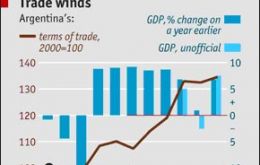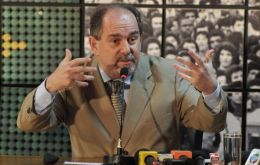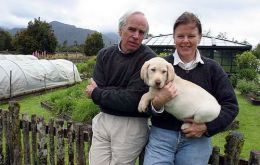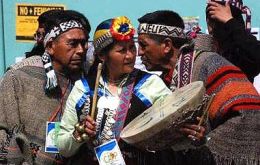MercoPress. South Atlantic News Agency
Stories for August 2010
-
Sunday, August 22nd 2010 - 03:05 UTC
The Economist on Argentina's economy: happy-go-lucky Cristina

Earlier this year, Cristina Fernández de Kirchner, Argentina’s president, proffered some advice to European governments facing recession and market panic. Its essence was “stuff the IMF and carry on spending.” It is what she and her predecessor and husband, Néstor Kirchner, have practiced since 2003. Argentina is one of only a handful of countries that refuse all dealings with the IMF. Almost a decade after it defaulted on $90 billion of debt when its economy collapsed, it still has few financial ties with the world and very little bank credit. Yet contrary to repeated forecasts of doom from orthodox economists, the economy is roaring.
-
Sunday, August 22nd 2010 - 02:58 UTC
Expanding Alliances in the 21st Century: The U.S. and Brazil Unite to Address Matters of National Security
The recent signing of a new defense agreement between the Western hemisphere’s two dominant powers, Brazil and the United States, has brought about an important change to Latin America’s relations with the U.S. On April 12, 2010, Brazil took another step to enhance its geopolitical influence by signing the U.S.-Brazil Defense Cooperation Agreement (DCA).
-
Saturday, August 21st 2010 - 15:22 UTC
More government land to Cuban small farmers to help boost food production

The Cuban government has awarded in usufruct over a million hectares to small farmers one of the main reforms promoted by President Raúl Castro to help the country’s economy recover from its deep recession and cut the huge imported food bill that conditions Cuban international reserves.
-
Saturday, August 21st 2010 - 14:34 UTC
Argentine economy expanding at 9% with strong activity in all sectors

Argentine economic activity surged 11.1% in June over a year ago which means GDP in the first seven months of 2010 expanded 9%, according to figures released by the country’s National Statistics Institute, Indec.
-
Saturday, August 21st 2010 - 13:45 UTC
Austerity measures to balance the budget, if Dilma is Brazil’s next president

Brazil's ruling coalition candidate could adopt austerity measures to balance public accounts if elected president in October and also favours a heavier state hand in the oil and mining industries, her party chief told reporters.
-
Saturday, August 21st 2010 - 13:44 UTC
Argentine farmers demand regulations limiting foreign ownership of land

The number of land in the hands of foreigners in Argentina has almost tripled in the last 10 years, a phenomenon that is spreading to areas that are rich in natural resources and that is affecting small towns that are finding themselves enclosed within the domains of large landholders.
-
Saturday, August 21st 2010 - 13:42 UTC
Lula da Silva recommends Dilma to think and act as the “mother of the poor”

President Lula da Silva compared candidate Dilma Rousseff to a mother and recommended, if elected, to always think about the poor. Lula da Silva and Ms Rousseff participated in a political rally Friday night in the metropolitan Sao Paulo.
-
Saturday, August 21st 2010 - 13:39 UTC
Chile questioned over slow implementation of Indigenous Peoples convention

International Labour Organization (ILO) Standards Director Cleopatra Doumbia-Henry is meeting in the Chilean city of Temuco this week with Araucanía Region (IX) officials to discuss the lack of progress in implementing the ILO’s Indigenous and Tribal Peoples Convention.
-
Friday, August 20th 2010 - 03:16 UTC
US Jobless benefits jump to highest since November; markets tumble

Claims for United States jobless benefits jumped to the highest level since November and Philadelphia-area manufacturing shrank for the first time in a year, indicating the US economy may be slowing faster than forecast.
-
Friday, August 20th 2010 - 02:53 UTC
Twelve months inflation expectations in Argentina steady at 25%

Argentines expect prices to rise 25% over the next twelve months, according to the median estimate in a monthly survey by Buenos Aires-based Torcuato Di Tella University. Expectations in August remained unchanged from last month’s report, the university said in an e-mailed report.
